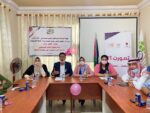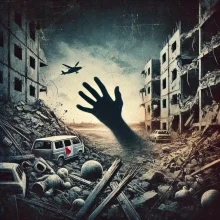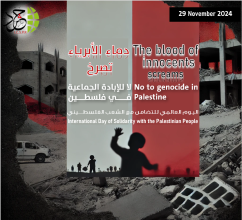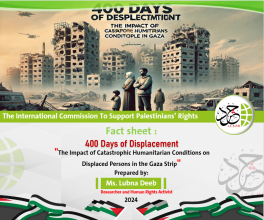
In cooperation with the Ministry of Health, ICSPR organizes the “Pink October” event to emphasize the right of women to access health services.
Num: 76/ 2021
Date : 17 Oct 2021
Press release
In cooperation with the Ministry of Health, ICSPR organizes the “Pink October” event to emphasize the right of women to access health services.
Occupied Palestine/Gaza: The International Commission to Support Palestinians’ Rights (ICSPR), in cooperation with the Palestinian Health Education and Health Promotion Department, organized on Sunday 17/10/2021 the “Pink October” event, to emphasize the right of women to access health services.
Activist Fatima Al-Zahra Abu Shaaban opened the meeting and welcomed the guests, saying: “This meeting aims to discuss the reality of the right to treatment and health care in Gaza, which is the right of every citizen to enjoy the highest attainable level of health services, leading to recommendations that achieve improvements in health services quality in government hospitals, and ensures the promotion, respect and protection of the right to health, as an economic, social and cultural right, and one of the main elements of human dignity.
Salah Abdel-Atty, chairman of ICSPR’s board of directors, said: “The right to health is one of the main rights of every human being without discrimination, and this is stipulated in the Universal Declaration of Human Rights, the Constitution of the World Health Organization, the International Covenant on Economic, Social and Cultural Rights, and the Convention on the Elimination of All forms of discrimination against women, and the Palestinian Public Health Law.
And he indicated that the law stipulates a set of rights for the patient, including obtaining immediate care in emergency cases, receiving a clear explanation of the proposed treatment, and respecting the privacy and dignity of the patient, stressed that ensuring that citizens enjoy the right to an appropriate level of health does not take place without a clear policy for the authority, but there is a decline in the volume of services provided, especially with regard to providing medicines in health centers, and performing surgeries that have been delayed for long periods.
Abdel-Atty stressed the need to develop policies to reduce cancer, including increasing the commitment to cancer prevention and control, coordinating and conducting research, monitoring the cancer burden, developing practical strategies for cancer prevention, and strengthening health systems at the national and local levels in order to provide treatment and care services to cancer patients, providing access to a range of high-end health care services that women can afford, and providing technical assistance in order to transfer best practices in the fight against cancer quickly and effectively.
In turn, Abeer Ismail, from the Department of Health Education and Health Promotion, stressed that the Ministry of Health is working to educate citizens about the need for early detection of breast cancer, as it limits the spread of the disease and reduces the number of deaths.
She pointed out that during the past year, 324 new cases of breast cancer were discovered, and the rate of its prevalence among other types of cancer reached 18%, noting that the death rate decreased to 40% in the Gaza Strip.
She indicated that there are no direct causes for the spread of cancer, but there are risk factors, and if found, the woman is predisposed to cancer, like age, family medical history, women’s nutrition, in addition to breastfeeding.
Nima Kassab, a breast cancer survivor, spoke about her experience in fighting the disease and the methods she followed until she overcame it, stressing the importance of early detection of the disease so that it is dealt with in its early stages.
The attendees stressed the need to address the obstacles and challenges that threaten the lives of cancer patients, neutralize the health sector from political conflicts, and develop strategic plans to improve health services provided to patients.
They also called on the community to provide the health sector in Gaza with the medicines, medical supplies, and fuel needed to operate alternative energy generators in the case of a power outage, with the need to develop the health sector and improve the capacities of hospitals and health facilities.





